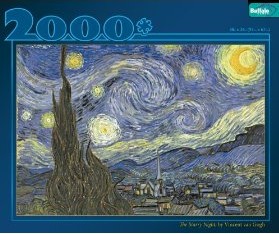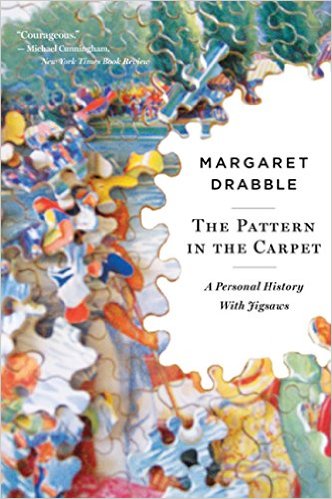Jigsaws and Margaret Drabble's The Pattern in the Carpet
Hints for completing a jigsaw
(in addition to advice in Drabble's
The Pattern in the Carpet)
Hints for writing a novel in the NaNoWriMo chellenge
Drabble's The Pattern in the Carpet
This book is not a memoir, although parts of it may look like a memoir.
Not is it a history of the jigsaw puzzle, although that is what it was once
meant to be. It is a hybrid.
I have always been more interested in content than in form, and I have never been a tidy writer.
From the start of the Foreword on p.ix.
|
Margaret Drabble's philosophy of puzzle solving
is a little more linear than mine:
We always started with the frame.
Auntie Phyl taught my sisters and me how to pick out all the straight-edged pieces of a jigsaw
first, to find the corners, and to build up the four sides.
Then we would begin sort the colours, and to construct areas of the picture.
From the start of Section 2 on p.9.
|
However I am increasingly of the mind to complete some bold interior portion first, such as
a curving grey highway with freshly painted lemon stripes along it, and leave the mundanity
of the edges for later or for others.
In addition to dipping into strategies for jigsaw-solving and reminisces of Auntie Phyl,
Drabble is enthusiastic to dip into literature, such as:
I used to feel slightly embarrassed by my juvenile liking for Verne's work, and was both surprised
and relieved to discover that he is one of the heroes of Oulipo, that 1960s games-playing and
cryptogram-loving movement of the French avant-garde. (Oulipo stands for
'Ouvroir de littérature potentielle'.)
p.77.
|
As for the origin of the jigsaw:
The first jigsaw puzzles took the form of 'dissected maps' and the earliest of these were credited
to John Spilsbury (1739-1769). Spilsbury was an engraver, printmaker and cartographer ...
Spilsbury's idea was dazzlingly simple. He mounted maps on this mahogany boards and cut them
along country or county boundaries with a fine marquetry set.
From the start of Section 17 on p.111.
|
What is the appeal to Drabble of the jigsaw?
One of the reasons why the jigsaw appeals to me ... is that it is pre-made,
its limits finite, its frame fixed.
No ordinary degree of manual clumsiness (and mine is advanced ...) can yet prevent me
from finishing a jigsaw. It can't be done badly. Slowly, but not badly.
All one needs is patience.
p.180.
|
She:
greatly admire[d] Life: A User's Manual [by Perec],
with its densely physical evocation of life in an apartment house in Paris, its
cellular design, its cleverly overlapping stories, its obsessions, its closely observed
descriptions of jigsaw practice and jigsaw mania, its sociological acuity,
its multitude of 'things'.
p.224.
|
In her untitled chapters she also includes discussion of copyright of the illustrations
and the variable adherence to appropriate credit for the artwork.
And we return to the Oulipean with:
I don't want to write out of anger.
The avoidance of anger has been my self-imposed Oulipean constraint while writing this.
It has not been as difficult as trying to avoid the letter E,
but it has been taxing.
There may be one or two little splinters and signifiers of anger remaining in my text,
but they are so deeply buried and coded that not even I can be sure of finding them.
... Jigsaws are a useful antidote to anger.
p.336.
|
And in conclusion:
The jigsaw, with its frame, is a simulacrum of meaning, order and design.
...
Books, too, have beginnings and endings, and they attempt to impose a pattern,
to make a shape. We aim, by writing them, to make order from the chaos.
We fail.
The admission of failure is the best that we can do.
It is a form of progress.
p.338.
|
2006: The Sea Lady
Here, Drabble's intellectual "topic" is marine biology and her social topic (in addition to the usual feminism)
is manipulation or control.
Three boys and a girl spend a month in a north England (south Scotland?) seaside village.
Their relationships continue (though with some large intervals) into old age,
with their varied view points and reliabilities. A charming read.
One of her characters, called the Public Orator, a reader-accosting narrator,
turns out to be not so much a jarring modish-break-the-4th-way conceit as just an old guy with a job to do and
strings to pull, and an ability to write a "forgiving" brief biography of the pushy, self-promoting,
and self-absorbed heroine:
Ailsa Kelman, scholar and feminist, is celebrated for her pioneering studies of gender
and for her gift for lucid and dramatic exposition ... courageous explorations of
women's achievements, ambitions and limitations. ...
The University of Ornemouth is proud to recognize her unique achievements
as a cultural historian in an area that she has made her own, but into which
she has welcomed many of her admirers.
p.258.
|
2013: The Pure Gold Baby
Here, Drabble's intellectual "topic" is anthropology. Her social topic (in addition to the usual feminism)
is the care of those less able to care for themselves.
The novel studies the mothering of a happy and well-loved girl, Anna, who is:
one of those special babies.
You know them, you have seen them.
You have seen them in parks, in supermarkets, at airports.
They are the happy ones, and you notice them because they are happy.
They smile at strangers, when you look at them their response is to smile.
They were born that way, you say, as you go thoughtfully on your way
... But the baby was supernatural in his happiness.
p.4-5.
|
The mother in the story, Jess, had trained as an anthropologist, and was grounded by her
single-mummy pregnancy. The novel is Drabble's exploration of how helpful local friends can be,
how a partly socialist system can also provide fragments of support, and how one
muddles through.
Along the way, we learn some pop-anthropology. And we also learn a little about what Jess/Drabble
thinks of "arch-parodist Vladimir Nabokov", Dr. "Livingston as a proto-imperial trader
with a gun, as she had been taught to do",
Lionel Penrose whose 'law' "stated that the population of prisons and
psychiatric hospitals is inversely related", William Wordsworth, and others.
It stays (illuminated by its mini-lecture detours) mainly on message, apart from
a few small excursions such as this into global warming:
My Ike [the narrator's son], always a wanderer, works for a backpacking guidebook,
and has been to more uncomfortable places than most.
In theory Jess ought to disprove of this, and so perhaps should I,
but Ike is a charmers and an enthusiast and we love him,
despite his massive carbon footprint.
p.203.
|
With a support system around her, mainly her mother and her mother's friends, Jess's
daughter Anna grows into a protected adulthood.
|
I worry about Anna's future.
I don't like to bring up the subject with Jess.
But I've resolved that I'll be brave and have a go.
I'm going to ask her to supper to talk about it, next week.
Or maybe the week after next.
...
Jess much have her own plans.
It's none of my business.
I don't like to meddle.
p.291.
|
Which puts it back on us.
What whould you do?
Time Line
- 1939.
- Born in Sheffield, Yorkshire, UK.
- 1960.
- Graduated from the University of Cambridge with a 'double starred first in English'.
- Marries.
- 1963.
- Publication of first novel:
A Summer Bird-Cage.
- 1964.
- Publication of
The Garrick Year.
- 1965.
- 3rd novel: The Millstone.
- 1966.
- Nonfiction:
The Wordsworth (Literature in Perspective series).
- John Llewellyn Rhys Memorial Prize for The Millstone.
- 1967.
- Jerusalem the Golden,
winner of the James Tait Black Memorial Prize.
- 1969.
- 5th novel: The Waterfall.
- Movie: A Touch of Love (film version of
The Millstone).
- 1970.
- Paris Review interview by Barbara Milton.
- 1972.
- The Needle's Eye.
- 1973.
- Virginia Woolf: A Personal Debt.
- E. M. Forster Award.
- 1974.
- Nonfiction:
Arnold Bennett: A Biography.
- 1975.
- The Realms of Gold.
- Marriage dissolved.
- 1976.
- Nonfiction:
The Genius of Thomas Hardy (editor).
- 1977.
- The Ice Age.
- 1978.
- Nonfiction:
For Queen and Country: Britain in the Victorian Age.
- 1979.
- Nonfiction:
A Writer's Britain: Landscape in Literature.
- 1980.
- The Middle Ground.
- 1985:
- Edited The Oxford Companion to English Literature (5th edition).
- 1987.
- 10th novel: The Radiant Way.
- 1989.
- A Natural Curiosity.
- 1991.
- The Gates of Ivory.
- Appointed Commander of the Order of the British Empire (CBE)
in the 1980 Queen's Birthday Honours.
- 1995.
- Nonfiction:
Angus Wilson: A Biography.
- 1996.
- The Witch of Exmoor.
- 2000:
- Nonfiction:
Edited The Oxford Companion to English Literature (6th edition).
- 2001.
- The Peppered Moth.
- 2002.
- 15th novel: The Seven Sisters.
- 2004.
- The Red Queen.
- 2006.
- 17th novel: The Sea Lady.
- 2008.
- Promoted to Dame Commander of the Order of the British Empire (CBE)
in the 1980 Queen's Birthday Honours.
- 2009.
- Nonfiction:
The Pattern in the Carpet: a Personal History with Jigsaws.
- 2011.
- A Day in the Life of a Smiling Woman,
a collection of Drabble's short stories.
- Awarded the Golden PEN Award by the English PEN for
"a Lifetime's Distinguished Service to Literature".
- 2013.
- 18th novel: The Pure Gold Baby.


 Biopsychology.
Biopsychology.
 Criminal Behavior.
Criminal Behavior.
 Death and Dying.
Death and Dying.
 Ecology.
Ecology.
 Enneagram.
Enneagram.
 Evolution.
Evolution.
 Evolutionary Psychology.
Evolutionary Psychology.
 Personality Psychology
Personality Psychology
 Psychological research methods.
Psychological research methods.
 Nature of Prejudice by Gordon W. Allport.
Nature of Prejudice by Gordon W. Allport.
 Learned Optimism by Martin E. P. Seligman.
Learned Optimism by Martin E. P. Seligman.
 Pessimism (defensive) (Norem).
Pessimism (defensive) (Norem).

 Links.
Links.
 Our BLOG (web log) of Books to read.
Our BLOG (web log) of Books to read.
 Book Log archive.
Book Log archive.
 Best books read.
Best books read.
 Reviews of Harry Potter books.
Reviews of Harry Potter books.
 Blog of Drabble's The Pattern in the Carpet.
Blog of Drabble's The Pattern in the Carpet.
 The Pattern in the Carpet
as one of the Best books read in 2016.
The Pattern in the Carpet
as one of the Best books read in 2016.
 Mary Karr's The Art of Memoir.
Mary Karr's The Art of Memoir.
 David Lodge's The Art of Fiction.
David Lodge's The Art of Fiction.